Friends of Cañada de los Osos Ecological Reserve
Outdoor Education
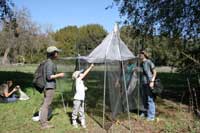
SJSU Students
Checking Insect Trap
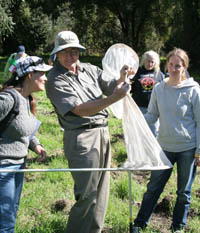
Gavilan Community
College Students
Surveying for Insects
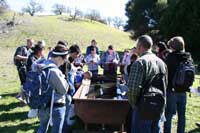
Gavilan Ecology Class
Sampling Water Quality
and Acquatic Invertebrates
Outdoor field classes continue to be an important part of the activities at the Cañada de los Osos Ecological Reserve. With new partners from San Jose State University, Gavilan Community College, and other educational institutes, new research projects and field study programs are being developed on the Reserve. In the first week in March, graduate students from San Jose State started working on an entomology project, as well as a swallow research project. Gavilan College's ecology class was also in the field working on insect collections, water quality sampling, and other hands-on wildlife projects.
On March 27 and 28, 2012 Drs. Mike Ziccardi, Nancy Anderson and Christine Fiorello from the U.C. Davis School of Veterinary Medicine brought a class of 12 vet students to the Reserve as part of a five day spring break field course focusing on central California species, ecosystems, and management issues.
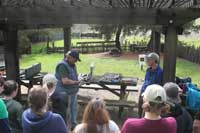
UC Davis Veterinary Class
Getting Training with
Tranquilizing Equipment
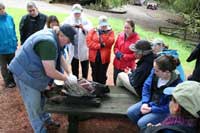
Dr. Dave Jessup Demonstrates
a Necropsy of a Wild Turkey
Found Dead in the Field
UC Davis Class
Getting Training
on Radiotracking Wildlife
The two days at the Reserve were packed. Tuesday’s agenda included a walking tour of the valley floor and some of the habitat improvement projects, then a firearms safety and handling course, and a video on wildlife capture techniques by Henry Coletto. A rainy barbeque was followed by evening power point sessons on deer, wild pigs and other wildlife found on the Reserve, presented by volunteers Martha Schauss and Henry Coletto. On Wednesday morning, Dr. Dave Jessup led a discussion and slide talk on diseases of deer in the Western United States, followed by telemetry and GPS use discussions led by Drs. Ziccardi, Fiorello and Anderson and a field exercise led by Dr. Anderson. After lunch a second short telemetry exercise was conducted, and a session on use of dart guns.
While in the field, a fresh dead turkey was found, giving a perfect opportunity for a necropsy demonstration. Dr. Jessup performed the necropsy while the vet students looked on. Samples were collected and were sent off to the pathologist to determine the cause of death. The students all got a fun break from their classroom studies in a beautiful location, while getting real world experiences in wildlife management.
Outdoor hands-on education classes are the key to better wildlife management. Wildlife managers are faced with many challenges, which will only become more complex as California’s human population continues to grow and as climate change impacts wildlife habitat. The coming generation will need to find new solutions for habitat loss and human and wildlife conflict issues. There will be an even greater need to educate the general population about the importance of managing natural resources in California and throughout the world.